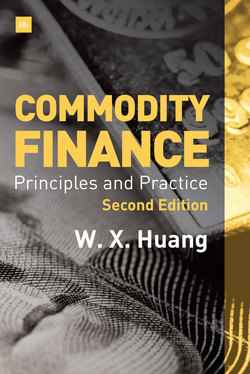Описание книги
Very few books published so far have touched upon commodity finance and fewer still have provided a systematic explanation and analysis of the subject. It is however a subject that is relevant throughout almost every corner of the world. From food to gold, commodities are ubiquitous.
In this book, Dr. W. Huang, a practitioner and a trainer, covers commodities, commodity markets, commodity trade and the finance of commodity trade. As such, practitioners such as bankers and traders in commodity finance, and those institutions operating in this field, or planning to be active in this field, will all benefit from this book.
This revised and updated second edition is a hands-on summary of commodity finance, with a special chapter dedicated to real-life case studies of commodity finance.
Topics covered include:
– High-level overview of commodity trade and finance. – The three major sectors of commodity finance: soft commodities, hard commodities and energy. – Commodity finance and emerging markets, as most commodity export countries are emerging markets countries. – The special mechanisms and products of commodity finance, from plain vanilla products to more complicated structures. The concept of Supply Chain Finance is also covered in detail. – Bank and country risk. – Risk management principles, with practical case studies. – The organization of a typical commodity finance bank.
The key benefits of the book are: For bankers – how to do business and what risks should be watched for? For traders, brokers and institutional investors – how commodity finance is done and what bank instruments can be used. For students – how is commodity finance handled and developed by banks?
Each chapter can be read independently. The content has been reviewed by both experts and newcomers, incorporating their comments on style and content, to ensure it is as useful and clear as possible.
In this book, Dr. W. Huang, a practitioner and a trainer, covers commodities, commodity markets, commodity trade and the finance of commodity trade. As such, practitioners such as bankers and traders in commodity finance, and those institutions operating in this field, or planning to be active in this field, will all benefit from this book.
This revised and updated second edition is a hands-on summary of commodity finance, with a special chapter dedicated to real-life case studies of commodity finance.
Topics covered include:
– High-level overview of commodity trade and finance. – The three major sectors of commodity finance: soft commodities, hard commodities and energy. – Commodity finance and emerging markets, as most commodity export countries are emerging markets countries. – The special mechanisms and products of commodity finance, from plain vanilla products to more complicated structures. The concept of Supply Chain Finance is also covered in detail. – Bank and country risk. – Risk management principles, with practical case studies. – The organization of a typical commodity finance bank.
The key benefits of the book are: For bankers – how to do business and what risks should be watched for? For traders, brokers and institutional investors – how commodity finance is done and what bank instruments can be used. For students – how is commodity finance handled and developed by banks?
Each chapter can be read independently. The content has been reviewed by both experts and newcomers, incorporating their comments on style and content, to ensure it is as useful and clear as possible.
